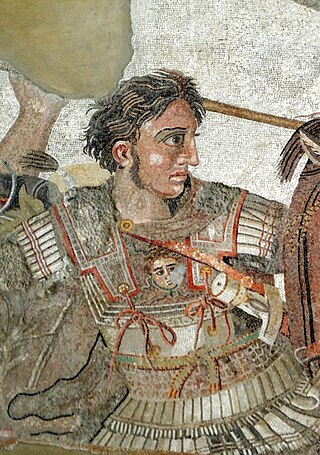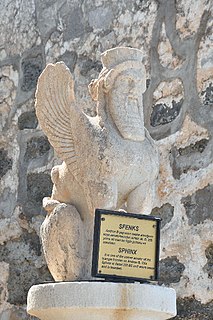
Year 323 BC was a year of the pre-Julian Roman calendar. At the time, it was known as the Year of the Consulship of Longus and Cerretanus. The denomination 323 BC for this year has been used since the early medieval period, when the Anno Domini calendar era became the prevalent method in Europe for naming years.

Darius III, originally named Artashata and called Codomannus by the Greeks, was the last king of the Achaemenid Empire of Persia, from 336 BC to 330 BC. Artashata adopted Darius as a dynastic name.
Year 330 BC was a year of the pre-Julian Roman calendar. At the time, it was known as the Year of the Consulship of Crassus and Venno. The denomination 330 BC for this year has been used since the early medieval period, when the Anno Domini calendar era became the prevalent method in Europe for naming years.

The wars of Alexander the Great were fought by King Alexander III of Macedon, first against the Achaemenid Persian Empire under Darius III, and then against local chieftains and warlords as far east as Punjab, India. Due to the sheer scale of these wars, and the fact that Alexander was generally undefeated in battle, he has been regarded as one of the most successful military commanders of all time. By the time of his death, he had conquered most of the world known to the ancient Greeks. Although being successful as a military commander, he failed to provide any stable alternative to the Achaemenid Empire—his untimely death threw the vast territories he conquered into civil war.

Alexander: War Chronicles, released in North America as Reign: The Conqueror, in Europe as Alexander the Great and in South America as Alexander Senki, is a Korean-Japanese anime first released in 1999. A re-imagination of the life of Alexander the Great based on the novel of the same name by Hiroshi Aramata, the series was produced by an international crew that drew from the resources of the worldwide animation community. Character and setting design for the show was conceived by Peter Chung. Most of the production work was handled by Korean animators.
Parmenion was an ancient Macedonian general in the service of Philip II of Macedon and Alexander the Great. A nobleman, Parmenion rose to become Philip's chief military lieutenant and Alexander's Strategos. He was assassinated after his son Philotas was convicted on a charge of treason.
Philotas was the eldest son of Parmenion, one of Alexander the Great's most experienced and talented generals. He rose to command the Companion Cavalry, but was accused of conspiring against Alexander and executed.

Asander or Asandros was the son of Philotas and brother of Agathon. He was a Macedonian general under Alexander the Great, and satrap of Lydia from 334 BC as well as satrap of Caria after Alexander's death.
Amyntas was a Macedonian officer in Alexander the Great's army, son of Andromenes from Tymphaia. After the battle of the Granicus, 334 BC, when the garrison of Sardis was quietly surrendered to Alexander, Amyntas was the officer sent forward to receive it from the commander, Mithrenes. Two years after, 332, we again hear of him as being sent into Macedonia to collect levies, while Alexander after the siege of Gaza advanced to Egypt; and he returned with them in the ensuing year, when the king was in possession of Susa.
Polemon, son of Andromenes the Stymphaean, was a Macedonian officer in the service of Alexander the Great. The great intimacy between him and Philotas caused him to be suspected in 330 BC, together with his brothers Amyntas, Attalus, and Simmias, of participating in the treasonable designs imputed to Philotas: a charge to which Polemon had the imprudence to give countenance by taking to flight immediately on learning the arrest of Philotas. Amyntas, however, who remained, having successfully defended himself before the assembly of the army, obtained the pardon or acquittal of Polemon also.
Coenus, a son of Polemocrates and son-in-law of Parmenion, was one of the ablest and most faithful of Alexander the Great's generals during his eastern expedition.
Nicanor, son of Parmenion, was a distinguished officer in the service of Alexander the Great. He is first mentioned at the passage of the Danube river, in the expedition of Alexander against the Getae, 335, when he led the phalanx. But during the expedition into Asia he appears to have uniformly held the chief command of the body of troops called the Hypaspists (υπασπισται) or foot-guards, numbering three units of 1,000 men. As his brother Philotas did that of the εταιρoι, or horse-guards. We find him mentioned, as holding this post, in the three great battles of the Granicus, of Issus, and of Gaugamela. He afterwards accompanied Alexander with a part of the troops under his command, during the rapid march of the king in pursuit of the king Darius III Codomannus in 330; which was probably his last service, as he died of disease shortly afterwards, during the advance of Alexander into Bactria. His death at this juncture was considered a fortunate event, as it prevented him from participating either in the designs or the fate of his brother Philotas.
Philotas was a Macedonian officer in the service of Alexander the Great, who commanded one taxis or division of the phalanx during the advance into Sogdiana and India. It seems probable that he is the same person mentioned by Curtius, as one of those rewarded by the king at Babylon for their distinguished services. There is little doubt also, that he is the same to whom the government of Cilicia was assigned in the distribution of the provinces after the death of Alexander, 323 BC. In 321 BC, he was deprived of his government by Perdiccas and replaced by Philoxenus, but it would seem that this was only in order to employ him elsewhere, as we find him still closely attached to the party of Perdiccas, and after the death of the regent united with Alcetas, Attalus, and their partisans, in the contest against Antigonus. He was taken prisoner, together with Attalus, Docimus, and Polemon, in 320 BC, and shared with them their imprisonment, as well as the daring enterprise by which they for a time recovered their liberty, when they took possession of their prison, overpowering their guards. He again fell into the power of Antigonus, in 316 BC.

Orontobates was a Persian, who married the daughter of Pixodarus, the usurping satrap of Caria, and was sent by the king of Persia to succeed him. On the approach of Alexander the Great of Macedon Orontobates and Memnon of Rhodes entrenched themselves in Halicarnassus. But at last, despairing of defending it, they set fire to the town, and under cover of the conflagration crossed over to Cos, whither they had previously removed their treasures. In addition to the island of Cos, Orontobates, retained control of the citadel at Salmacis, and the towns Myndus, Caunus, Thera and Callipolis together with Triopium.

Ariobarzanes also spelled as Ario Barzan or Aryo Barzan ; died 330 BC), also known as Ariobarzanes the Brave, was an Achaemenid prince, satrap and a Persian military commander who led a last stand of the Persian army at the Battle of the Persian Gate against Macedonian King Alexander the Great in the winter of 330 BC.

The Battle of the Persian Gate was a military conflict between Achaemenid Persian army, commanded by the satrap of Persis, Ariobarzanes, and the invading Hellenic League, commanded by Alexander the Great. In the winter of 330 BC, Ariobarzanes led a last stand of the outnumbered Persian forces at the Persian Gates near Persepolis, holding the Macedonian army for a month. Alexander eventually found a path to the rear of the Persians from the captured prisoners of war or a local shepherd, eventually capturing Persepolis.

Classical Greece was a period of around 200 years in Greek culture. This Classical period saw the annexation of much of modern-day Greece by the Persian Empire and its subsequent independence. Classical Greece had a powerful influence on the Roman Empire and on the foundations of Western civilization. Much of modern Western politics, artistic thought, scientific thought, theatre, literature, and philosophy derives from this period of Greek history. In the context of the art, architecture, and culture of Ancient Greece, the Classical period corresponds to most of the 5th and 4th centuries BC. The Classical period in this sense follows the Greek Dark Ages and Archaic period and is in turn succeeded by the Hellenistic period.
Pharnabazus III was a Persian satrap who fought against Alexander the Great. His father was Artabazus II, and his mother a Greek from Rhodes.

The Battle of Thebes was a battle that took place between Alexander the Great and the Greek city-state of Thebes in 335 BC immediately outside of and in the city proper in Boeotia. After being made hegemon of the League of Corinth, Alexander had marched to the north to deal with revolts in Illyria and Thrace, which forced him to draw heavily from the troops in Macedonia that was maintaining pressure on the Greek city-states of the south to keep them in subjection. Although Alexander did not desire to destroy Thebes, after sending several embassies requesting their submission on what he considered merciful terms, he eventually decided to destroy the city as an example to others.














